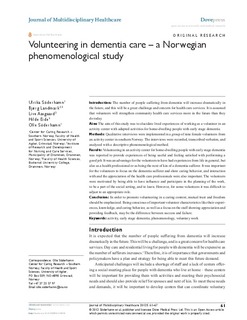| dc.contributor.author | Söderhamn, Ulrika | |
| dc.contributor.author | Landmark, Bjørg | |
| dc.contributor.author | Aasgaard, Live | |
| dc.contributor.author | Eide, Hilde | |
| dc.contributor.author | Söderhamn, Olle | |
| dc.date.accessioned | 2012-03-05T10:28:43Z | |
| dc.date.available | 2012-03-05T10:28:43Z | |
| dc.date.issued | 2012 | |
| dc.identifier.citation | Söderhamn, U., Landmark, B., Aasgaard, L., Eide, H., & Söderhamn, O. (2012). Volunteering in dementia care – a Norwegian phenomenological study. Journal of Multidisciplinary Healthcare, 5, 61-67. doi: 10.2147/JMDH.S28240 | no_NO |
| dc.identifier.issn | 1178-2390 | |
| dc.identifier.uri | http://hdl.handle.net/11250/138679 | |
| dc.description | Published version of an article in the journal: Journal of Multidisciplinary Healthcare. Also available from the publisher at: http://dx.doi.org/10.2147/JMDH.S28240. OA | no_NO |
| dc.description.abstract | Introduction: The number of people suffering from dementia will increase dramatically in the future, and this will be a great challenge and concern for health care services. It is assumed that volunteers will strengthen community health care services more in the future than they do today.
Aim: The aim of this study was to elucidate lived experiences of working as a volunteer in an activity center with adapted activities for home-dwelling people with early stage dementia.
Methods: Qualitative interviews were implemented in a group of nine female volunteers from an activity center in southern Norway. The interviews were recorded, transcribed verbatim, and analyzed with a descriptive phenomenological method.
Results: Volunteering in an activity center for home-dwelling people with early stage dementia was reported to provide experiences of being useful and feeling satisfied with performing a good job. It was an advantage for the volunteers to have had experiences from life in general, but also as a health professional or as being the next of kin of a dementia sufferer. It was important for the volunteers to focus on the dementia sufferer and show caring behavior, and interaction with and the appreciation of the health care professionals were also important. The volunteers were motivated by being able to have influence and participate in the planning of the work, to be a part of the social setting, and to learn. However, for some volunteers it was difficult to adjust to an appropriate role.
Conclusion: In order to promote volunteering in a caring context, mutual trust and freedom should be emphasized. Being conscious of important volunteer characteristics like their experiences, knowledge, and caring behavior, as well as a focus on the staff showing appreciation and providing feedback, may be the difference between success and failure. | no_NO |
| dc.language.iso | eng | no_NO |
| dc.publisher | Dovepress | no_NO |
| dc.subject | activity, early stage dementia, phenomenology, voluntary work | no_NO |
| dc.title | Volunteering in dementia care – a Norwegian phenomenological study | no_NO |
| dc.type | Journal article | no_NO |
| dc.type | Peer reviewed | no_NO |
| dc.subject.nsi | VDP::Medical disciplines: 700::Health sciences: 800::Community medicine, Social medicine: 801 | no_NO |
| dc.source.pagenumber | 61-67 | no_NO |
| dc.source.volume | 5 | no_NO |
| dc.source.journal | Journal of Multidisciplinary Healthcare | no_NO |
